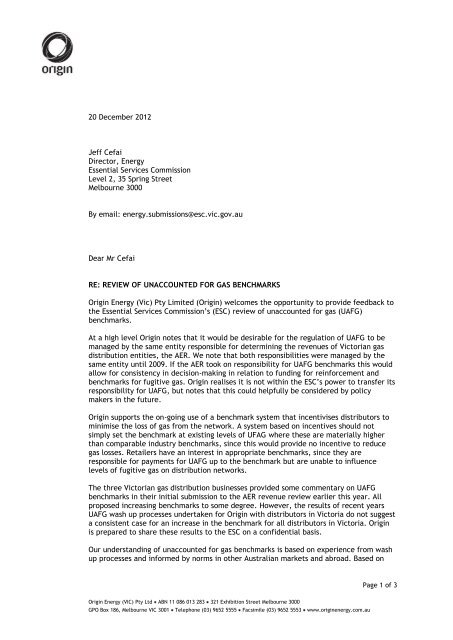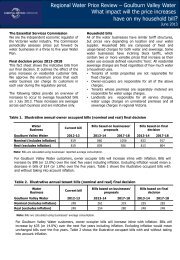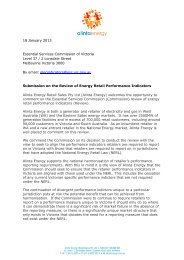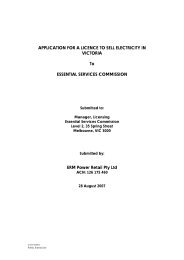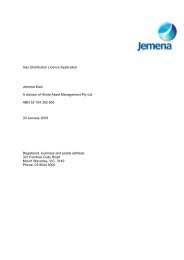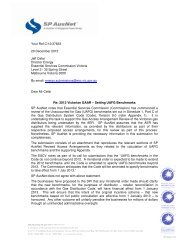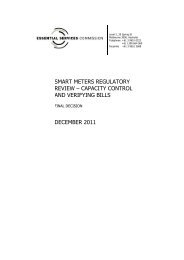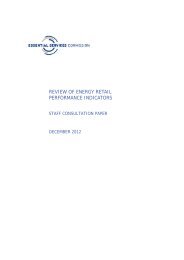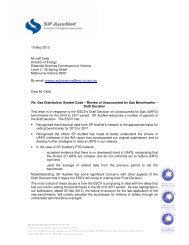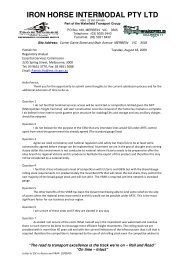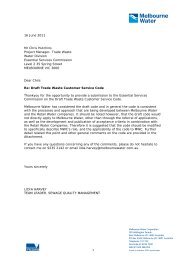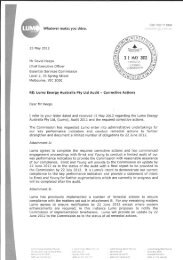Origin Energy Letter - Essential Services Commission
Origin Energy Letter - Essential Services Commission
Origin Energy Letter - Essential Services Commission
Create successful ePaper yourself
Turn your PDF publications into a flip-book with our unique Google optimized e-Paper software.
20 December 2012<br />
Jeff Cefai<br />
Director, <strong>Energy</strong><br />
<strong>Essential</strong> <strong>Services</strong> <strong>Commission</strong><br />
Level 2, 35 Spring Street<br />
Melbourne 3000<br />
By email: energy.submissions@esc.vic.gov.au<br />
Dear Mr Cefai<br />
RE: REVIEW OF UNACCOUNTED FOR GAS BENCHMARKS<br />
<strong>Origin</strong> <strong>Energy</strong> (Vic) Pty Limited (<strong>Origin</strong>) welcomes the opportunity to provide feedback to<br />
the <strong>Essential</strong> <strong>Services</strong> <strong>Commission</strong>’s (ESC) review of unaccounted for gas (UAFG)<br />
benchmarks.<br />
At a high level <strong>Origin</strong> notes that it would be desirable for the regulation of UAFG to be<br />
managed by the same entity responsible for determining the revenues of Victorian gas<br />
distribution entities, the AER. We note that both responsibilities were managed by the<br />
same entity until 2009. If the AER took on responsibility for UAFG benchmarks this would<br />
allow for consistency in decision-making in relation to funding for reinforcement and<br />
benchmarks for fugitive gas. <strong>Origin</strong> realises it is not within the ESC’s power to transfer its<br />
responsibility for UAFG, but notes that this could helpfully be considered by policy<br />
makers in the future.<br />
<strong>Origin</strong> supports the on-going use of a benchmark system that incentivises distributors to<br />
minimise the loss of gas from the network. A system based on incentives should not<br />
simply set the benchmark at existing levels of UFAG where these are materially higher<br />
than comparable industry benchmarks, since this would provide no incentive to reduce<br />
gas losses. Retailers have an interest in appropriate benchmarks, since they are<br />
responsible for payments for UAFG up to the benchmark but are unable to influence<br />
levels of fugitive gas on distribution networks.<br />
The three Victorian gas distribution businesses provided some commentary on UAFG<br />
benchmarks in their initial submission to the AER revenue review earlier this year. All<br />
proposed increasing benchmarks to some degree. However, the results of recent years<br />
UAFG wash up processes undertaken for <strong>Origin</strong> with distributors in Victoria do not suggest<br />
a consistent case for an increase in the benchmark for all distributors in Victoria. <strong>Origin</strong><br />
is prepared to share these results to the ESC on a confidential basis.<br />
Our understanding of unaccounted for gas benchmarks is based on experience from wash<br />
up processes and informed by norms in other Australian markets and abroad. Based on<br />
Page 1 of 3<br />
<strong>Origin</strong> <strong>Energy</strong> (VIC) Pty Ltd ABN 11 086 013 283 321 Exhibition Street Melbourne 3000<br />
GPO Box 186, Melbourne VIC 3001 Telephone (03) 9652 5555 Facsimile (03) 9652 5553 www.originenergy.com.au
this, our view is that unaccounted for gas in the range of 2.5 to 3.5 percent of throughput<br />
is a commonly accepted range. The International Gas Union’s Working Committee on<br />
Distribution carried out a broad review of gas mains in comparable markets in 2009 and<br />
estimated a figure of 2.7% of throughput as an industry average, after outlying data had<br />
been removed. 1<br />
<strong>Origin</strong> notes the comments of two distributors to the AER that UAFG and spending on<br />
mains replacement appear no longer to be correlated. SP Ausnet noted that “losses are<br />
only a minor component of UAFG” and “there is no discernible correlation between low<br />
pressure mains replacement and UAFG reduction” 2 , while Multinet found that “there is<br />
no empirical evidence to establish a link between the replacement of cast iron pipes and<br />
a decline in actual UAFG [and so] Multinet proposes to set a forecast of UAFG using the<br />
latest available (2010) actual data”. 3 (Envestra provided its comments in a confidential<br />
attachment.)<br />
We consider the lack of correlation between spending on mains replacement and UAFG to<br />
be of concern and a matter that must be resolved, rather than simply formalised through<br />
increased UAFG benchmarks. If spending on mains replacement is not affecting the<br />
overall level of lost gas this calls in to question both the justification for that spending<br />
and the management of the networks in question. We acknowledge that there may be<br />
some delay between approval for spending on mains replacement and its impact on<br />
fugitive gas, but as the average age of the pipes continues to fall (through expansion and<br />
renewal), losses should continue to fall. This is particularly the case on the faster<br />
growing networks SP Ausnet and Envestra.<br />
<strong>Origin</strong> notes in this context that the <strong>Essential</strong> <strong>Services</strong> <strong>Commission</strong> of South Australia<br />
amended its UAFG target based on Envestra’s mains replacement plan approved by the<br />
technical regulator to achieve a significant reduction in UAFG by 2016. Evidently there is<br />
still some expectation by the South Australian regulators that spending on mains<br />
replacement will reduce levels of UAFG and that this should be reflected in UAFG<br />
benchmarks.<br />
To the extent factors other than leaks are driving increased UAFG distributors need to<br />
improve understanding and measurement of these. In this context we note SP Ausnet’s<br />
findings that the other major causes of UAFG were problems associated with<br />
measurement. We note that measurement on the distribution networks is also the<br />
responsibility of the network and is governed by market standards, and as such the risk of<br />
inaccurate measurement is still best managed by the distributor and the benchmark<br />
should reflect this allocation of risk. In this context the ESC might wish to consider<br />
requiring a more in depth study of metering problems and how these are contributing<br />
UAFG. This might allow distributors to focus their efforts on reducing UAFG where the<br />
investment will have the best return.<br />
In summary, <strong>Origin</strong> has yet to see a convincing explanation for an increase in UAFG<br />
benchmarks across all networks. In light of significant mains replacement programmes<br />
proposed for coming years we could expect to see a reduction or no change in<br />
benchmarks, rather than uniform increases. Retailers have very little control over losses<br />
1 International Gas Union, Working Committee 4: Distribution, 2006-2009 Triennium Work Report,<br />
October 2009, p.6; www.igu.org/html/wgc2009/committee/WOC4/WOC4.pdf<br />
2 SP Ausnet Access Arrangement Information, Initial Proposal, p.24<br />
3 Multinet Access Arrangement Information, Initial Proposal, p.25<br />
Page 2 of 3
on the network or the accuracy of measurement and believe responsibility for managing<br />
the associated risks should sit with the party best placed to manage these.<br />
Should you have any questions in relation to the above submission, please contact me on<br />
(03) 9652 5555.<br />
Yours Sincerely<br />
[SIGNED]<br />
Steven Macmillan<br />
Regulatory Manager<br />
Page 3 of 3


